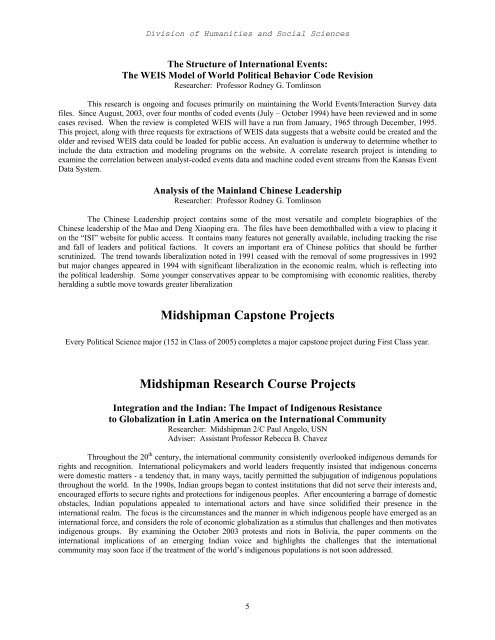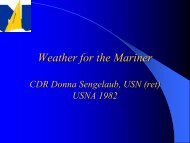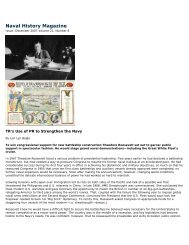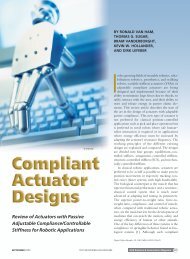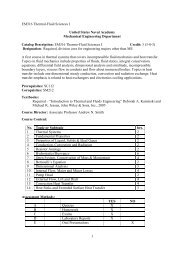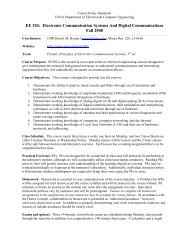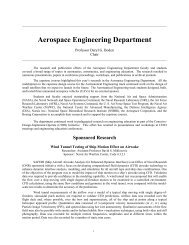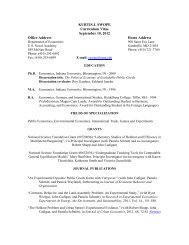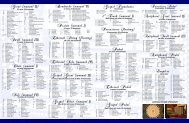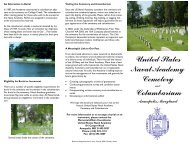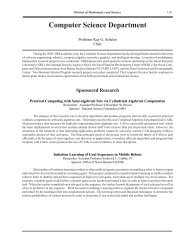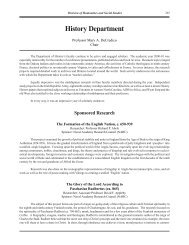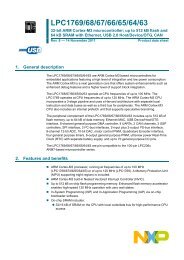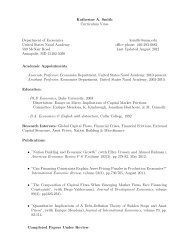Political Science Department - United States Naval Academy
Political Science Department - United States Naval Academy
Political Science Department - United States Naval Academy
- No tags were found...
Create successful ePaper yourself
Turn your PDF publications into a flip-book with our unique Google optimized e-Paper software.
Division of Humanities and Social <strong>Science</strong>sThe Structure of International Events:The WEIS Model of World <strong>Political</strong> Behavior Code RevisionResearcher: Professor Rodney G. TomlinsonThis research is ongoing and focuses primarily on maintaining the World Events/Interaction Survey datafiles. Since August, 2003, over four months of coded events (July – October 1994) have been reviewed and in somecases revised. When the review is completed WEIS will have a run from January, 1965 through December, 1995.This project, along with three requests for extractions of WEIS data suggests that a website could be created and theolder and revised WEIS data could be loaded for public access. An evaluation is underway to determine whether toinclude the data extraction and modeling programs on the website. A correlate research project is intending toexamine the correlation between analyst-coded events data and machine coded event streams from the Kansas EventData System.Analysis of the Mainland Chinese LeadershipResearcher: Professor Rodney G. TomlinsonThe Chinese Leadership project contains some of the most versatile and complete biographies of theChinese leadership of the Mao and Deng Xiaoping era. The files have been demothballed with a view to placing iton the “ISI” website for public access. It contains many features not generally available, including tracking the riseand fall of leaders and political factions. It covers an important era of Chinese politics that should be furtherscrutinized. The trend towards liberalization noted in 1991 ceased with the removal of some progressives in 1992but major changes appeared in 1994 with significant liberalization in the economic realm, which is reflecting intothe political leadership. Some younger conservatives appear to be compromising with economic realities, therebyheralding a subtle move towards greater liberalizationMidshipman Capstone ProjectsEvery <strong>Political</strong> <strong>Science</strong> major (152 in Class of 2005) completes a major capstone project during First Class year.Midshipman Research Course ProjectsIntegration and the Indian: The Impact of Indigenous Resistanceto Globalization in Latin America on the International CommunityResearcher: Midshipman 2/C Paul Angelo, USNAdviser: Assistant Professor Rebecca B. ChavezThroughout the 20 th century, the international community consistently overlooked indigenous demands forrights and recognition. International policymakers and world leaders frequently insisted that indigenous concernswere domestic matters - a tendency that, in many ways, tacitly permitted the subjugation of indigenous populationsthroughout the world. In the 1990s, Indian groups began to contest institutions that did not serve their interests and,encouraged efforts to secure rights and protections for indigenous peoples. After encountering a barrage of domesticobstacles, Indian populations appealed to international actors and have since solidified their presence in theinternational realm. The focus is the circumstances and the manner in which indigenous people have emerged as aninternational force, and considers the role of economic globalization as a stimulus that challenges and then motivatesindigenous groups. By examining the October 2003 protests and riots in Bolivia, the paper comments on theinternational implications of an emerging Indian voice and highlights the challenges that the internationalcommunity may soon face if the treatment of the world’s indigenous populations is not soon addressed.5


